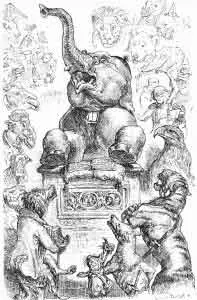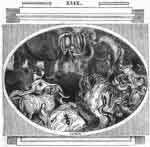An Elephant spoke of animal vices to an assembly. Some were silent and nodded in agreement. Others who saw themselves in the talk were offended.
If words hurt think carefully about the meaning behind them.

JBR Collection
The wise Elephant, whose efforts were always directed towards the benefit of his society, saw with much concern the many abuses among the beasts, which called loudly for reform. He therefore assembled them, and, with all due respect and humility, began a long harangue; and enlarged for more than a quarter of an hour, remarking all their vices, also a thousand ridiculous habits, particularly their unworthy idleness, their rapacious selfishness, their wanton cruelty and spiteful envy, all which so conspicuously appeared among them. To many of his auditors this speech appeared extremely delightful and judicious, and they listened with open-mouthed attention, especially such as the innocent Dove, the faithful Dog, the obedient Camel, the harmless Sheep, and even the little industrious Ant; the busy Bee also approved much of this lecture. Another part of the audience were extremely offended, and could scarcely endure so long an oration; the Tiger, for instance, and the rapacious Wolf were exceedingly tired, and the Serpent hissed with all his might, whilst a murmur of disapprobation burst from the Wasp, the Drone, the Hornet, and the Fly. The Grasshopper hopped disdainfully away from the assembly, the Sloth was indignant, and the insolent Ape mimicked the orator in contempt. The Elephant, seeing the tumult, concluded his discourse with these words: “My advice is addressed equally to all, but remember that those who feel hurt by any remarks of mine acknowledge their guilt. The innocent are unmoved.”

Northcote
[Note: The Northcote fable is the same fable as in the JBR Collection above. Only the illustrations and Application associated with the fable in the Northcote book are displayed here.]
Application
It must be remembered that fables are addressed to all nations, and not alone to this country, or to this present time: they are intended to bring to notice the faults in conduct which have disfigured the world at all periods, as well as those of the present time, and are not levelled at any one in particular. He who is made angry, must seek for redress from his own bosom; and may be certain that it is himself that is in the wrong, and not the representation in the fable.


